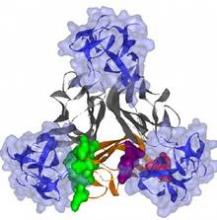Tumor necrosis factor inhibitor drugs began to dominate treatment of inflammatory diseases like rheumatoid arthritis, psoriasis, and the inflammatory bowel diseases ulcerative colitis and Crohn’s disease a little over a decade again. Now, the time when the importance of the anti-TNFs will wane and newer drugs will take their place is clearly visible on the horizon. It hasn’t happened yet, but the era of anti-TNF dominance for treating inflammatory diseases that persisted throughout the 2000s will end in the next 5 years.
The anti-TNF era began in 1998 with the approval of etanercept (Enbrel) for rheumatoid arthritis and infliximab (Remicade) to treat Crohn’s disease. In subsequent years, the list of approved anti-TNFs expanded to include adalimumab (Humira), golimumab (Simponi), and certolizumab (Cimzia), and the approved indications grew to include many inflammatory disease of joints, the GI tract, and skin. The anti-TNFs revolutionized inflammatory disease treatment and made treatment to remission possible for many patients.
But reports from just the past month show that new agents are overtaking the anti-TNFs.
In May, I reported from Digestive Disease Week on phase III trial results with vedolizumab, which was compared against placebo for patients with ulcerative colitis. One of the study investigators noted that vedolizumab beat the placebo arm for steroid-free clinical remission by 30 percentage points. “Nothing else is that good,” Dr. William Sandborn, professor of medicine and chief of gastroenterology at the University of California, San Diego, told me, and the benchmark he had in mind was the performance of the anti-TNFs in similar patients.
More recently, at the European Congress of Rheumatology earlier this month I heard a report on a head-to-head comparison of the anti-IL-6 drug tocilizumab (Actemra) and the anti-TNF adalimumab in patients with rheumatoid arthritis. After 24 weeks of monotherapy, patients on tocilizumab had nearly a fourfold higher remission rate than patients on adalimumab. Though the monotherapy trial design did not mimic the way most rheumatoid arthritis patients get treated, the new drug tocilizumab absolutely blew adalimumab out of the water in a rare head-to-head comparison among different classes of anti-inflammatory drugs.
And at the same meeting several talks highlighted another new anti-inflammatory class of agents coming soon to the U.S. market, the Janus kinase (JAK) inhibitors, such as tofacitinib, which is expected to received FDA approval later this summer. Phase III results show that tofacitinib has safety and efficacy that seems at least comparable to anti-TNF drugs, with the advantage of oral dosing.
Vedolizumab, tocilizumab, and tofacitinib are just the tip of new waves of anti-inflammatory drugs that will soon substantially alter a landscape that the anti-TNFs have mostly had to themselves for the past 14 years. For the moment, the anti-TNFs have the advantage of a longer track record for safety, but changing that is only a matter of time.
—Mitchel Zoler (on Twitter @mitchelzoler)


